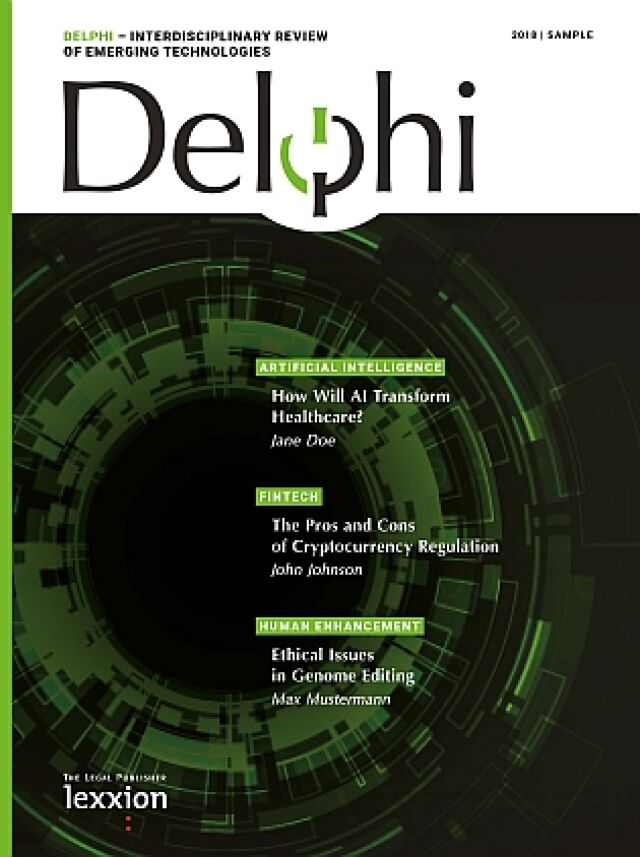Delphi is a pioneering interdisciplinary review of emerging technologies as seen through the perspectives of experts from the fields of science and technology, ethics, economics, business and law. Inspired by the idea to encourage inclusive, thoughtful – and sometimes unsettling – debates on the many opportunities and challenges created by technological progress, the international quarterly review brings together authors with different professional backgrounds as well as opposing views. Delphi goes beyond the buzzwords-heavy, analysis-light popular publications, but is more concise and practice-oriented than traditional academic journals. Contributions to Delphi come in diverse and compact formats and accessible language to guarantee a lively dialogue involving both thinkers and doers.
Topic Examples
● Recent developments and new trends in emerging technologies
● Regulatory needs created by emerging technologies
● Emerging technologies & the law
● Ethical questions raised by AI, biotech, fintech, etc.
● Impact of emerging technologies on our economies
● The revolution of business through AI, e.g. new business models
● Societal challenges created by technological progress
Emerging Technologies Covered in Delphi
artificial intelligence (AI), augmented reality (AR), autonomous vehicles, autonomous weapons, blockchains, biotech, robotics, cell atlas, cryptocurrencies, deep learning, fintech, genetic engineering, innovative materials, internet of things (IoT), nanotechnology, precision farming, quantum computing, virtual reality (VR), and others.
Target Audience
The review is read by big picture thinkers, who want to know how emerging technologies shape our present and future. Delphi addresses everyone with a background in one of the focus disciplines –science & technology, ethics, economics, business and law – as well as curious individuals. The issues tackled by Delphi are highly significant for professionals engaged in strategic, forward-looking and visionary functions. Readers in other positions, working more narrowly in one of the focus disciplines, will also benefit from the review's content. Geographically, the quarterly mainly targets Europe, North America, Asia and Africa, although other regions shall not be excluded.
Delphi's Structure and Content
- Diversity of Formats: Each issue is a well-balanced mix of articles, first-hand country or thematic reports, startups digest, interviews and reviews of books, films and events.
- Diversity of Perspectives: To bring you the 360°view on emerging technologies we ensure experts from different disciplines are featured in each edition.
- Accessibility: Presenting complex, in-depth analyses from a specialised field to readers from other disciplines is no easy task. Neither is staying concise on a topic you are passionate about. Delphi delivers the right balance on both.
- Neutrality: We don’t take sides. Views on emerging technologies could range – from existential threat for humanity to panacea for all problems, and everything else in between. Delphi’s only agenda is to provide a neutral platform for comprehensive, informed discourse.
- Always High Quality: To bring you insights you can rely on, all contributions published in Delphi are written and reviewed by experts.
Write for Delphi – Top 3 Benefits
1. Break Out of Your Silo
Present your ideas to a new audience of experts with other professional backgrounds. Contextualise your work within the broader discourse.
2. Collaborate
Take advantage of our network of experts from other countries and disciplines to collaborate on cross-cutting analyses of an emerging tech topic.
3. Reach Out Globally
The review is read internationally by thought leaders in business, research and policy, giving a boost to your contribution’s visibility.
